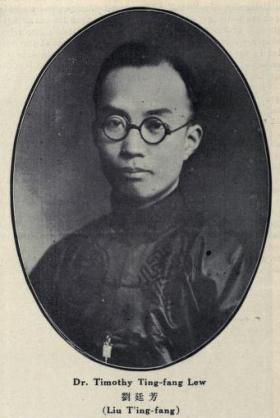Liu Tingfang (AKA Timothy Tingfang Lew) was a professor, dean, theologian, protestant leader, author, poet, essayist, translator, and editor; over the course of his career, he held teaching and administrative positions at Yenching University, Peking University, Union Theological Seminary, Shanghai Women's College, and the National Legislative Yuan of China.
"Silent night, holy night!" The Chinese edition of this "Christmas Eve" Carol is popular but the translator is obscure to the public. It was translated into Chinese by Liu Tingfang, who was widely known as a genuine genius.
A man of Truly talented
Liu Tingfang was born in January of 1892 into a noble family in Wenzhou, Zhejiang province in the reign of Guangxu emperor. His grandmother Mrs. Ye became the first Christian of the family after becoming a widow but was forced out of the family because of the foreign belief. She brought up Liu Shikui, father of Liu Tingfang, very successfully. When he was young, his mother sent him to a hospital to study in Yantai of Shandong Province built by a mainland Christian Association and soon went to the University of Edinburgh School for further medical study. After graduation, he became an ophthalmologist and returned to Taizhou (now Linhai) to start his career. Later he was married following his mother's order. They raised four sons and two girls afterward and Liu Tingfang was the firstborn son.
Liu Tingfang was very smart since childhood, with a strong memory and good understanding and received a good education. At the age of ten, he had read a large number of classics both domestic and overseas. After finishing high school he was admitted to Shanghai St. John's University, where he excelled in academic performance. After graduation, he went to the University of Georgia (University of Georgia), and in 1914 he obtained his bachelor's degree. Then he went to Columbia University in New York (Columbia University) to study and a year later obtained his master's degree. In 1918, he received a bachelor's degree in theology from the Yale Divinity School. He received his Ph.D. in Education and Psychology from Columbia University in 1920 in the end.
The seminary teacher
When he studied in the United States, he had been a very active student leader. He served as the chairman of the international Chinese Students Union and an editor of International Chinese Student Christian Association, responsible for editing the page about international students in the USA. In 1918 he began to teach at the Union Theological Seminary in New York, becoming the first Chinese to teach in an American Theological Seminary.
After returning home in 1920, he was appointed as the director of the Institute of Education in Normal University, also served as a professor of psychology at Peking University and a professor in the school of religion at Yanjing University.
The psychologist
Tingfang was one of the few psychologists of the Republic of China, a rare Christian psychologist. He received his Ph.D. in Education and Psychology from Columbia University in 1920 and returned to serve as a professor of psychology at Peking University.
Liu Tingfang was the founder of the Department of Psychology at Yanjing University. As he suggested, the study of psychology and philosophy was separated from each other, psychology becoming an independent department. After the establishment of an independent department of psychology, he served as the first director. In Yanjing University Liu Tingfang taught both psychology and pedagogy. He also co-spoke with Professor William A. McCall, a professor of psychology at Columbia University, in a conference to promote the implementation of psychometric tests in China, which had a great impact.
Moreover, as a Christian pastor, Liu Ting-fang had contributed in introducing psychology to the Church in China. He believed that all science including psychology was not enemies of Christianity, but good friends.
The poet, church musician
Liu Tingfang is also a passionate poet, proficient in several languages, and published a few collections of poetry such as "mountain rain"; and his greatest contribution should be his translation of a large number of Christian praise songs (the following is included in the 400 new hymns ), Such as "Ode To Joy", "Joyful Joyful," "Oh Great Is The Holy Name" "Joy to the world" and so on.
In addition to the translation, Liu Tingfang also composed his own lyrics, created a poem of praise "broke the life song", "Xintian Xindi Ge" and so on.
The church leader
In 1922, the Chinese National Assembly of Christianity was held in Shanghai. Liu Tingfang served as the chairman of the drafting group of the General Assembly, and also one of the main speakers of the General Assembly. He accepted believers from other denominations. His open and inclusive spirit won the praise of Chinese and foreign participants. Shortly thereafter, Liu Tingfang was ordained as a priest, serving in Mishi Christian Church of Beijing.
John Leighton Stuart also spoke highly of Liu: It is difficult to describe in details the important role Dr. Liu as a church leader has played in the history of Chinese Christianity here. He stood out in all kinds of religious gatherings and activities because of his unmatched speaking capacity in Chinese and his passion. He had been a prominent figure in most of the Christian international conferences during the 20 years before his death in 1948.
On March 12, 1925, Sun Zhongshan died. Liu Tingfang was invited to conduct the funeral service due to his prestige in the Chinese Church, and his wife Ms. Wu Zhuosheng a classmate of Mr. Sun's wife in the USA who were good friends with each other. With the assistance of the Anglican Bishop Zhu, they held a solemn funeral service for Sun Zhongshan in Beijing Union Medical College before he was buried by the state.
Continual hard work greatly damaged Liu's health. In 1942 he had to leave China for American to cure his tuberculosis. Until 1946, due to the worsening of his illness, he died in a New Mexico Presbyterian nursing home, when only 56 years old.
Translated By: Alvin Zhou










